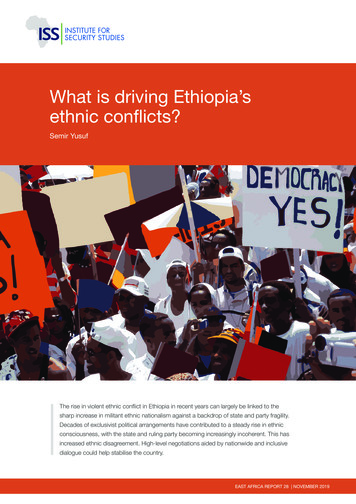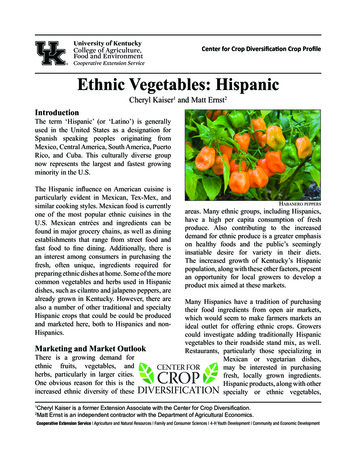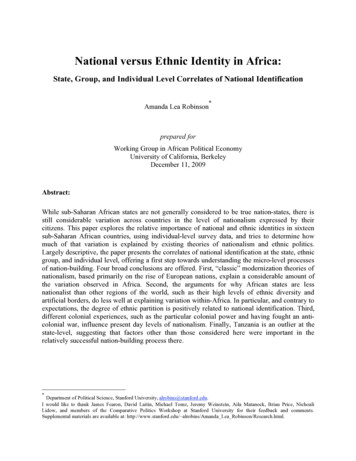DESTROYING ETHNIC IDENTITY:DESTROYING ETHNIC
DESTROYING ETHNIC IDENTITY:THE TURKS OF GREECEAugust 1990A Helsinki Watch ReportHuman Rights Watch485 Fifth AvenueNew York, NY 10017Tel. (212) 972-8400Fax (212) 972-0905Human Rights Watch1522 K Street, NW, #910Washington, DC 20005Tel. (202) 371-6592Fax (202) 371-0124
(c) August 1990 by Human Rights WatchAll rights reserved.Printed in the United States of AmericaISBN 0-929692-70-5Library of Congress Catalogue Card Number: 90-84212HELSINKI WATCHHelsinki Watch was established in 1979 to monitor and promote observance ofinternationally-recognized human rights in the Helsinki signatory countries. The Chairmanof Helsinki Watch is Robert L. Bernstein; Vice Chairmen are Jonathan Fanton and AliceHenkin; Executive Director is Jeri Laber; Deputy Director is Lois Whitman; WashingtonRepresentative is Catherine Cosman; Staff Counsel are Holly Cartner and Theodore Zang, Jr.HUMAN RIGHTS WATCHHuman Rights Watch is composed of five Watch Committees: Africa Watch, AmericasWatch, Asia Watch, Helsinki Watch, and Middle East Watch.Executive Committee: Robert L. Bernstein, Chairman; Adrian W. DeWind, Vice Chairman;Roland Algrant; Lisa Anderson; Peter Bell; Dorothy Cullman; Jonathan Fanton; JackGreenberg; Alice H. Henkin; Stephen Kass; Marina Kaufman; Jeri Laber; Aryeh Neier; BruceRabb; Kenneth Roth; Orville Schell; Sophie C. Silberberg; Gary Sick; Nadine Strossen.Staff: Aryeh Neier, Executive Director; Kenneth Roth, Deputy Director; Holly J. Burkhalter,Washington Director; Ellen Lutz, California Director; Susan Osnos, Press Director.INTERNATIONAL HELSINKI FEDERATION FOR HUMAN RIGHTSHelsinki Watch is an affiliate of the International Helsinki Federation for Human Rights, ahuman rights organization that links Helsinki Committees in the following countries ofEurope and North America: Austria, Canada, Czechoslovakia, Denmark, England, the FederalRepublic of Germany, Finland, France, Hungary, Italy, the Netherlands, Norway, Poland, theSoviet Union, Spain, Sweden, Switzerland, the United States, Yugoslavia.The Chairman of the International Federation for Human Rights is Karl Johannes vonSchwarzenberg; the Secretary General is Gerald Nagler; the Executive Director is YadjaZeltman.
Table of ContentsPreface . iIntroduction .1The Greek Government's ObligationsUnder International Law.5Treaty of Lausanne .51968 Protocol.6European Convention for the Protection of HumanRights and Fundamental Freedoms .6Helsinki Final Act .61989 Concluding Act of Vienna Follow-up Meetingto the Conference on Security and Cooperationin Europe .7The Greek Constitution.9Greek Violations of the Human Rightsof the Turkish Minority.11Deprivation of Citizenship.11Freedom of Movement: Passport Seizures.13Freedom of Movement in Restricted Areas.14Denial of Ethnic Identity .14Cases Against Dr. Sadik Ahmet andMr. Ismail Serif . 17Degrading Treatment .22Freedom of Expression.23Religious Freedom .26Mosques.26Selection of Muftis.28Control of the Wakfs (Pious Foundations).29Political Freedom.29
Equal Rights.30International and National Guarantees.30Land and Houses.32Expropriation of Land.35Business and Professional Life.36Licenses.37Civil Service Jobs.37Credit .39Schools.39Schoolbooks.41Recommendations .43Appendices.45
AcknowledgmentsThis report is based largely on information gathered by Lois Whitman, DeputyDirector of Helsinki Watch, during a fact-finding mission to Western Thrace in May1990. It was written by Lois Whitman.
PrefaceBetween 120,000 and 130,000 ethnic Turks live in Western Thrace, in thenortheastern part of Greece. Members of the Turkish minority speak Turkish aswell as Greek, send their children to schools in which they are taught in bothTurkish and Greek, and are proud of their Turkish origins and resentful of Greekefforts to deny their ethnic identity. The Greek government refers to them as"Greek Moslems," or "Hellenic Moslems," and flatly denies the existence of aTurkish minority in Western Thrace.Ethnic Turks emphasized to a Helsinki Watch fact-finding mission thatwent to Western Thrace in May 1990 that they are loyal Greek citizens and thatthere is no separatist movement in Western Thrace. "We don't want to go toTurkey," a Moslem lawyer said. "We just want the invisible Berlin Wall to comedown; we want to have our origins recognized and our human rights protected."The policy of the Greek government with regard to the Turkish minorityseems to be, as described by the Minority Rights Group, a "deliberate policy ofdiscrimination with a long-term aim of assimilation."1 The findings of the HelsinkiWatch mission certainly confirm this analysis. The many abuses of human rightsdocumented in this report reveal a pattern of denying the Turkish minority therights granted to other Greek citizens; the pattern includes outright deprivation ofcitizenship; denials of the right to buy land or houses, to set up businesses or torebuild or repair Turkish schools; restrictions on freedom of expression,movement and religion; and degrading treatment of ethnic Turks by governmentofficials.The Turkish minority reports that for many years the Greek governmenthas been trying to reduce the number of ethnic Turks in Western Thrace. This hasbeen done by techniques ranging from deprivation of citizenship to "encouraging"emigration to Turkey, to efforts to assimilate the Turkish minority. A Greek policythat began in 1985, for example, made it easier for Greek Turks who are willing toleave Western Thrace to establish themselves in other parts of Greece. It ispossible for ethnic Turks to buy land and houses, and to find employment inAthens, on Crete, in Kavala, or in other places in Greece, so long as they are willingto take along their families, to give up residence in Western Thrace and to vote inthe new areas. The Turkish minority reported to Helsinki Watch, however, thatthose who leave cannot get civil service jobs if they identify themselves as Turks1Minority Rights Group, Minorities in the Balkans, Report No. 82, October 1989, page 33.i
or as Moslems, and, of course, that there are no Turkish schools for their children.Sadik Ahmet, a surgeon who is now a member of Parliament, pointed out that "forthe rich it's easy to move, but for the poor, impossible."In any case, the pull of identification with Western Thrace is strong. "Thisis my fatherland," Dr. Ahmet told Helsinki Watch. "I was born here, I want to stayhere. I want to spend my life in Western Thrace. It's the home of my family, myfriends, my village, my grandparents. I don't want to leave."* * *This is Helsinki Watch's first report on human rights in Greece. Althoughwe have been following for some time the plight of the Turkish minority in WesternThrace, the fact-finding mission on which this report is based was in response to18-month prison sentences that were handed down to two ethnic Turkish politicalcandidates for Parliament, Dr. Sadik Ahmet and Mr. Ismail Serif, in January 1990,for the crime of using the word "Turkish" to describe the Turkish minority inWestern Thrace. The Court held that this act violated the Greek Penal Code by"openly or indirectly inciting citizens to violence or creating rifts among thepopulation at the expense of social peace."This flagrant denial of the ethnic identity of the Turkish minority inWestern Thrace was not an isolated event. The Greek High Court in 1988 had infact upheld a 1986 decision by the Court of Appeals in Western Thrace in whichthe Union of Turkish Associations of Western Thrace was ordered closed becauseit was called "Turkish." The word "Turkish," the court held, could refer only tocitizens of Turkey, and its use to describe Greek Moslems was held to endangerpublic order.Further research suggested a pattern whereby the Greek governmenthas been denying to the Turkish minority many rights accorded to other Greekcitizens, and curtailing their free expression and political freedom. This pattern ina Western democracy like Greece is of great concern to Helsinki Watch. Thisreport describes some of the policies and practices that seriously restrict thehuman rights of the Turkish minority in Western Thrace.Greek officials were cooperative and helpful during the Helsinki Watchmission to Western Thrace. The Nomarks (governors) of both Xanthi and Komotini,Constantine Thanopolous and Dionysus Karahalios, gave interviews on shortnotice. Mr. Evangelos Damianakis, the Greek official responsible for WesternThrace, was extremely generous with his time.This report could not have been written without the help of the Turkishminority in Western Thrace. Special thanks go to Dr. Sadik Ahmet, Ahmet Faikoglu,ii
Ismail Serif, Ismail Molla Rodoplu, Adem Bekiroglu, Ahmet Haciosman, AliMuminoglu, Tefikoglu Sabri, Mustafa Arif, Sabri Haci Husseyin, Husseyin Aga andformer Mufti Mehmet Emin Aga.Lois WhitmanNew YorkAugust 1990iii
IntroductionTurks appear to have settled in Western Thrace in the twelfth century.People of Turkish origin have been living in Western Thrace for hundreds of years.In modern times, Western Thrace has been occupied by Bulgaria (1913-1919) andby the Allied Administration (1919-1920); it has belonged to Greece since 1920.In 1923 the Lausanne Treaty was signed, putting an end to the GrecoTurkish war. A convention signed at the same time provided for a compulsoryexchange of populations:2 about a million and a quarter Greeks left Turkey forGreece, and about half a million Turks returned to Turkey from Greece.3 But theconvention excluded from the population exchange two groups: Greeks living inIstanbul (then Constantinople) and Turks living in Western Thrace.Western Thrace is bordered on the north by Bulgaria, on the south by theAegean Sea, on the east by Turkey, and on the west by the Greek region ofMacedonia. It contains three administrative departments or provinces (nomoi):Xanthi, whose capital is the city of Xanthi (Turkish name: Iskece); Rodope, whosecapital is Komotini (Gumulcine); and Evros, whose capital is Alexandroupoli(Dedeagac).4Arriving at accurate population figures for the minority groups inWestern Thrace is difficult. According to figures submitted to the Lausanne PeaceConference by the Turkish delegation, the population of Western Thrace in 1923was 191,699, of whom 129,120 (67 percent) were Turks and 33,910 (18 percent)were Greeks; the remaining 28,669 were mostly Bulgarians, along with smallnumbers of Jews and Armenians. The Turks thus outnumbered the Greeks byabout four to one. Greeks claim that the Turkish minority numbered only 103,000in 1923, which is the number of exemption documents issued by the special MixedCommission of the League of Nations.52See Appendix A for the full text of the Convention, signed at Lausanne, January 30, 1923.3Bernard Lewis, The Emergence of Modern Turkey, Second Edition (1968), p. 354.4Since 1977, all Turkish village names have been changed to Greek names; it is forbiddento use Turkish names for official purposes, on pain of fines or imprisonment. In addition,giving the Turkish name in parentheses following the Greek name is not allowed. TheMinority Rights Group, Minorities in the Balkans, op. cit., page 33.5Alexis Alexandris, "Political Expediency and Human Rights: Minority Issues between1
The Turkish delegation also reported that the Turkish minority, mostlyfarmers, owned 84 percent of the land, and that Bulgarians owned 10 percent andGreeks, largely traders, owned 5 percent. Greek sources dispute these figures aswell.Population and land-ownership figures are quite different today. Thepopulation of Western Thrace is now about 360,000; most observers believe thatbetween 120,000 and 130,000 of these (between 33 and 36 percent) are of Turkishorigin.6 In a June 7, 1990, interview published in the Turkish daily newspaper,Cumhuriyet, Greek Minister of Justice Athanassios Kanellopoulos said that thereare 150,000 Greek citizens of Moslem faith in Western Thrace. This figureincludes Turkish Moslems, Pomaks and Gypsies, all of whom are Turkishspeaking. The Greek government contends that these are three separate groups;the Turkish minority claims that all consider themselves Turkish.The rate of population growth of the Turkish minority is reportedly ashigh as 2.8 percent. If members of the Turkish minority had not emigrated, itspopulation through natural growth would now be around 500,000, even if it hadgrown at a rate of only 2 percent. Instead, the current population of 120,000reflects the fact that between 300,000 and 400,000 Turks have left Western7Thrace since 1923. Most of these emigrants have gone to Turkey.Land ownership, too, has changed dramatically. Instead of owning 84percent of the land, the Turkish minority now owns between 20 and 40 percent.The historic enmity between Greece and Turkey has been reflected inGreece's treatment of the Turkish minority. Over the years, ethnic Turks havecomplained of human rights abuses involving denials of civil and political rights,restrictions on freedom of movement and free expression, interference with thefree exercise of religion, denial of ethnic identity, degrading treatment, anddiscrimination on the basis of ethnic origin. Greek authorities deny the existenceof the Turkish minority, asserting only that there is a Moslem minority in Greece, aminority population that is homogeneous in religion, but heterogeneous in origin.Greece and Turkey," Paper prepared for Minority Rights Conference, March 30-April 1, 1990,Copenhagen, page 5.6The Minority Rights Group, Minorities in the Balkans, op. cit., page 32.7The Greek community in Istanbul, about 100,000 in 1923, is now about 3,500, according tothe Greek government.2
The Greek Government's Obligations Under International LawThe Greek government's obligations to protect and guarantee the rightsof the Turkish minority have been established by international treaties andagreements.Treaty of LausanneArticles 37 through 45 of the Lausanne Treaty of 1923, described as"fundamental laws," set forth the obligations of the Greek and Turkishgovernments to protect the Turkish and Greek minorities in their territories.8 Eachcountry agreed to provide:oprotection of life and liberty without regard to birth, nationality,language, race or religion;ofree exercise of religion;ofreedom of movement and of emigration;oequality before the law;othe same civil and political rights enjoyed by the majority;ofree use of any language in private, in commerce, in religion, thepress and publications, at public meetings and in the courts;othe right to establish and control charitable, religious andsocial institutions and schools;oprimary schools in which instruction is given in bothlanguages; and8See Appendix B for full text of Articles 37 through 45 of the Treaty of Lausanne, signed inLausanne on July 24, 1923.5
ofull protection for religious establishments and piousfoundations.19681968 ProtocolIn December 1968, the Greek and Turkish governments signed a protocolissued by a Greek-Turkish cultural commission; among other things, the protocolguaranteed that each country would respect the religious, ethnic and nationalconsciousness of the Greek or Turkish minority within its borders.European Convention for the Protection of Human Rights and FundamentalFreedomsIn addition to agreeing to the provisions of the Lausanne treaty that dealdirectly with the rights of the Turkish minority in Greece, Greece has signed otherinternational documents designed to protect human rights, including theEuropean Convention for Human Rights. That convention establishes broadguarantees for human rights and fundamental freedoms. Among them are theright not be be subjected to inhuman or degrading treatment; the right to a fairtrial by an independent, impartial tribunal; the right to freedom of religion,expression, and association; the right to receive information without interferenceand regardless of frontiers; the right to an effective remedy for violations ofhuman rights; and the right to be free from discrimination because of religion ormembership in a national minority.Helsinki Final ActGreece was among the countries in the Conference on Security andCooperation in Europe (CSCE) that signed the Helsinki Final Act in 1975. PrincipleVII of that act provides broad guarantees for human rights and fundamentalfreedoms. It also requires that participating states respect the rights of nationalminorities within their territories to equality before the law, and to "fullopportunity for the actual enjoyment of human rights and fundamental freedoms."6
1989 ConcludingConcluding Document of the Vienna FollowFollow-Up Meeting to the Conferenceon Security and Cooperation in Europe (CSCE)The 1989 Concluding Document of the Vienna Follow-Up Meeting to theCSCE, which Greece signed, lays out the principles that guide relations betweenstates. Among these are ensuring human rights and fundamental fre
Sadik Ahmet, a surgeon who is now a member of Parliament, pointed out that "for the rich it’s easy to move, but for the poor, impossible."
ethnic mobilisation. Finally, debates continued between ethnic and Ethiopian nationalists on such fundamental issues as the history, identity and future destiny of the country. Above the cacophony of ethnic and anti-regime agitations prevailed a semblance of order and overall stability.15 Violent inter-ethnic conflicts erupted occasionally over 27
Bend It Like strong Beckham: /strong Ethnic Identity and Integration* We propose a theoretical framework to study the determinants of ethnic and religious identity along two distinct motivational processes which have been proposed in the social sciences: cultural conformity and
ethnic fruits, vegetables, and . herbs, particularly in larger cities. One obvious reason for this is the increased ethnic diversity of these areas. Many ethnic groups, including Hispanics, have a high per capita consumption of fresh produce. Also contributing to the increased demand for ethnic produce is a greater emphasis
a state’s ethnic make-up are poor predictors of conflict risk (Fearon and Laitin, 2003). In short, if the same factors lead to both a higher risk of insurgency and increased (decreased) ethnic salience (national salience), it may explain why insurgencies often take on ethnic organization. In sum, there are potentially very important reasons .
There is more than one way to verify an identity. Here is another way to verify the identity in Example 1. Rewrite as the difference of fractions. Reciprocal identity Pythagorean identity Combining Fractions Before Using Identities Ve rify the identity Solution Add fractions. Simplify. Pythagorean identity
Identity fabrication: A completely fictitious identity without any real PII Identity manipulation: Using slightly modified real PII to create a new identity Identity compilation: A combination of real and fake PII to form a new identity Until now, credit bureaus or financial institutions lacked means of matching social security .
Identity, Credential, and Access Management (ICAM) Identity Manager User Guide - Access Role User: OCIO MobileLinc_IT-Support-OCIO-IT 5 P a g e USDA For Official Use Only 2. Log into Identity Manager 2.1 Access the Identity Manager User Interface To access EEMS Identity Manager, go to the following URL: https://www.eauth.usda.gov
EFEKTIVITAS MEDIA PEMBELAJARAN E-LEARNING TERHADAP PRESTASI BELAJAR PENDIDIKAN AGAMA ISLAM SISWA DI SMA NEGERI 1 YOGYAKARTA SKRIPSI Diajukan Kepada Fakultas Ilmu Tarbiyah dan Keguruan Universitas Islam Negeri Sunan Kalijaga Yogyakarta Untuk Memenuhi Sebagian Syarat Memperoleh Gelar Sarjana Strata Satu Pendidikan Islam Disusun oleh: Aldila Siddiq Hastomo (09410111) PENDIDIKAN AGAMA ISLAM .























